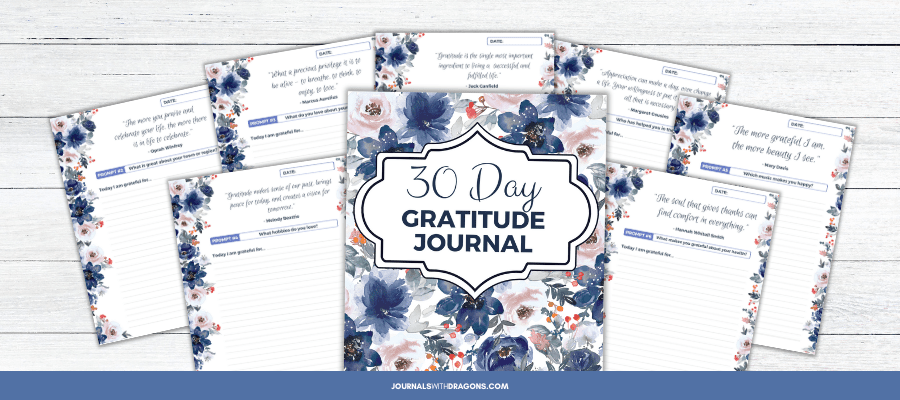This post contains affiliate links. Which means I will make a commission at no extra cost to you should you click through and make a purchase. Read the full disclosure here.
Gratitude journaling has become an increasingly popular practice, touted for its many benefits. Raved about for its potential to reduce stress and anxiety, improve relationships, and bring joy into our lives.
It almost sounds like a miracle solution to all our problems. But how much of this is actually true?
What evidence is there to back up the claims that gratitude journaling can have such a positive impact?
With more and more people raving about the power of gratitude journaling, it’s important to look into the facts.
Here’s a closer look at some of the benefits of gratitude journaling and some of the scientific research studies to back it up.
What Is Gratitude Journaling & How Can It Benefit You Mentally & Emotionally
You may have heard of gratitude journaling, but you might not be sure what it is exactly or how it can benefit you.
Gratitude journaling simply involves taking some time each day to write down things that you are grateful for. It can be anything from the sun shining to the smell of freshly brewed coffee in the morning.
The act of taking time to focus on the positive things in your life can help to shift your mindset from negative to positive.
This, in turn, can lead to a number of benefits, including decreased stress levels, improved sleep, and increased happiness. And you’ll find research studies below that help to back this up with science.
If you’re looking for a way to boost your mental and emotional health, gratitude journaling might be just what you need. Give it a try today and see how it makes you feel.
The Science Behind The Benefits Of Gratitude Journaling
There’s a reason why gratitude journaling is often recommended by therapists and mental health professionals. There’s actually quite a bit of science to back up the claims about its benefits.

Reducing stress, anxiety & depression
You may have seen social media posts about gratitude journaling or even tried it yourself. But have you ever wondered why this practice can be effective in reducing stress?
Let’s take a look at the science behind the benefits of gratitude journaling. When we experience stress, our bodies release cortisol, a hormone that helps us to deal with difficult situations. However, cortisol can also have negative effects on our health, including high blood pressure, weight gain, and depression.
Gratitude journaling has been shown to help reduce cortisol levels, leading to lower stress levels and improved physical health.
In addition, gratitude journaling can help to increase our sense of social connectedness and well-being.
For example, two studies by Wood, Alex M., et al. (2008) found that gratitude was associated with higher levels of perceived social support and lower stress.
This means that people who are more grateful might be able to rely on their friends or family members in tough times because they feel understood by them.
More recently, O’Leary, Karen, and Samantha Dockray (2015) found that completing a gratitude diary and reflecting on gratitude regularly several times a week improved depression, stress, and happiness scores for participants.

Sleep Quality
You may have heard about the benefits of gratitude journaling on sleep and dismissed it as another fad.
However, research has shown that gratitude journaling can have a significant impact on sleep quality.
The benefits of gratitude journaling on sleep are believed to be two-fold.
First, taking the time to reflect on what you are grateful for can help reduce stress and anxiety levels (as mentioned earlier).
This is because gratitude journaling allows you to focus on the positive aspects of your life rather than dwelling on the negative.
Let’s be honest; it’s super hard to sleep when you feel stressed and anxious, right?
Second, gratitude journaling can help to increase feelings of connectedness, social support, well-being, and optimism.
It’s thought that this might promote better sleep. This makes logical sense, as when we’re feeling good emotionally, we’re more likely to fall asleep and stay asleep throughout the night.
But what does the research say?
In the study by Jackowska, Marta, et al. (2016), participants completed 2 weeks of gratitude journaling, which correlated with increases in not only sleep quality but well-being and optimism.
This suggests that gratitude journaling did have a significant impact on sleep quality, well-being, and optimism for their participants.
If you’re struggling with insomnia or poor sleep quality, consider giving gratitude journaling a try. You may be surprised at how much it can help.
Furthermore, the study by Alkozei, Anna, et al. (2019) found that gratitude was linked to improvements in sleep quality as well as reduced symptoms of depression.
This suggests that if you are struggling with depression, gratitude journaling may help, which in turn may reduce presleep worries resulting in a better night’s sleep.

Self-esteem
Gratitude journaling is thought of as a simple but powerful tool you can use to boost your self-esteem.
For example, one study by Lin, Chih-Che. (2015) involving 235 university students. Found that students with higher levels of gratitude also had higher levels of self-esteem, less depression, and less suicidal ideation.
This suggests that gratitude journaling can positively impact your well-being in terms of your mental health.
Furthermore, another study by Lee, So-Young. (2017), looked at 73 dental hygiene students. The students used a gratitude journal for 3 weeks daily to record at least one thing they felt grateful for.
This resulted in the students having more self-esteem, happiness, and overall gratitude, even though the majority of them had never written a gratitude journal before.
Overall, this supports the idea that when you take the time to write down the things you’re grateful for, you’re actively training your brain to focus on the positive. And over time, this can lead to a more optimistic outlook and increased self-esteem.
So if you’re looking for a way to boost your self-esteem, give gratitude journaling a try.
Empathy & Compassion
Other research has shown that gratitude journaling can increase empathy and compassion. Studies have found that people who practice gratitude tend to be more generous, caring, and understanding of others.
One study by Kim, Grace Y., David Wang, and Peter Hill. (2018) studied 200 students through questionnaires. The study found that when higher levels of gratitude were present in students, it resulted in more compassionate love through empathy.
Think of it this way: gratitude journaling can help us slow down and appreciate the moments in our lives, which helps us become more mindful of what’s happening around us.
This, in turn, can help us to better recognize the struggles of our friends, family, and those around us and be more understanding when they’re going through a tough time.
For example, Oriol, Xavier, et al. (2020) conducted a large study of 1,356 students. The study found a strong relationship between self-transcendent aspirations (aspirations that focus on helping others and improving society), gratitude, and cognitive and affective empathy.
This means that people with self-transcendent aspirations are more likely to feel grateful and have better cognitive and emotional empathy.
One way to understand this is that gratitude journaling can help us cultivate an abundance attitude. When we learn to appreciate what we already have, we are less likely to compare ourselves to others or focus on what we don’t have.

Physical Health
Gratitude journaling has also been linked to improved physical health. Studies have found that people who practice gratitude tend to exercise more, eat healthier, and experience fewer aches and pains.
It’s things like this that lead to a wide range of physical health benefits, like eating healthier could contribute to lower blood pressure or losing weight.
The study by Fritz, Megan M., et al. (2019) supports this. It did two studies where teenagers practiced gratitude writing and weekly gratitude letters.
The study’s authors found that gratitude positively impacts healthy eating behavior in adolescents and young adults.
They suggest that gratitude interventions may help to improve unhealthy eating habits in young people and that their findings could have important implications for the prevention of obesity and other diet-related health problems in young people.
Another study by Bartlett, Monica Y., and Sarah N. Arpin. (2019) studied daily gratitude writing over 20 days.
The study found that gratitude positively influenced loneliness and health for older adults.
This suggests that even a simple daily gratitude practice can quite quickly improve your mindset, which can become beneficial to both your short-term and long-term health.
There’s even research to suggest (Cousin, Lakeshia, et al., 2021) gratitude journaling could be used as a low-cost tool for improving health-related behaviors, cardiovascular and heart disease risks.
Overall, these research studies suggest that focusing on the positive aspects of your life can lead to an overall better state of mind and more motivation to take care of yourself.

Increasing overall happiness
Research also suggests that gratitude journaling can work for increasing your overall happiness too.
Such as the study by Behzadipour, Sareh, Alireza Sadeghi, and Mojgan Sepahmansour. (2018), which used 90-minute gratitude training sessions to see if it could improve psychological well-being and happiness for hospital staff.
In their study, they found that gratitude training significantly affected all areas of psychological well-being (except for autonomy) and happiness for hospital staff.
This indicates that gratitude journaling can be an effective way to boost happiness and well-being even in difficult work environments.
Additionally, Witvliet, Charlotte vanOyen, et al. (2019) used two studies to assess whether gratitude writing could impact hope and happiness.
In the first study, the researchers found that gratitude was a stronger predictor of hope and happiness than other personality traits, such as patience and self-control.
The second study found that participants who wrote about things they were grateful for experienced a significant increase in both hope and happiness.
These findings suggest that gratitude writing can be an effective way to boost your happiness and increase your sense of hope for the future.

The Limitations Of Gratitude Research
While there is much research to support the benefits of gratitude journaling and the positive impact it can have on your life. There’s always research that doesn’t find the same results for different reasons, like the methods or the fact that many studies are limited by the variety of participants.
So while gratitude journaling can have benefits, it’s important to recognize the value of individual differences.
How gratitude works for you might vary compared to someone else, and by no means should you take practicing gratitude as a miracle cure to solve all problems.
Instead, consider gratitude journaling as a tool to help you on your journey for a more balanced life and not a substitute for medical care and advice from a professional practitioner such as your doctor or therapist.
How To Get Started With Gratitude Journaling – Tips For Beginners
If you’re ready to put the benefits of gratitude journaling to the test, there’s no need to overcomplicate things. You can start by simply setting aside 5-10 minutes each day (try first thing in the morning) to write down 3 things you’re grateful for.
It doesn’t have to be anything fancy—a simple notebook or even just a sheet of paper will do. But if you need a little help with inspiration or ideas, you can always try these:
Getting started with gratitude journaling can be daunting, especially if you’ve never done it before. Below are a few tips to help you get started with keeping a simple gratitude list, but there are plenty of other options for practicing gratitude to try too.
1. Set aside some time each day
Even if you can only spare just 5-10 minutes, sit down and write in your gratitude journal daily if you can.
Some people like to do it as part of their morning routine, while others prefer to do it at night before bed. Find what works best for you and stick to it.
2. Make a list of things you’re grateful for each day
The things you list can be big or small, but try to come up with at least 3 things.
If you’re having trouble getting started, think about the things that make you happy or the people in your life who are important to you. Or look at a gratitude list or prompts by someone else for ideas.
3. Write down why you’re grateful for each thing on your list
For example, if you’re grateful for your family, you might write down how much they mean to you or how they make you feel loved and supported.
If you’re grateful for your job, you might write about how it gives you a sense of purpose or how it allows you to support yourself financially. Expanding on why you’re thankful will help you appreciate the good things in your life even more.
4. Be specific and be honest with yourself
The more specific and genuine your gratitude journal entries are, the more benefits you’ll reap from the practice.
So don’t hold back – let yourself really feel gratitude for all the good things in your life! And if there’s something you don’t feel grateful for, that’s okay too. Don’t make the mistake of forcing yourself to be grateful for things if it’s not true.
Finally, be sure sure to check this blog post for even more gratitude journaling tips to help you get the most out of your time spent.

Give Gratitude Journaling A Try For Yourself
Gratitude journaling is a simple yet powerful tool that can help you cultivate a more positive outlook on life.
By taking just a few minutes out of each day to reflect on what you’re grateful for, you can significantly improve your mental and emotional health—not to mention your physical health and overall well-being.
So why not give it a try? You might just be surprised by how much it can change your life for the better.
Here are some further resources to help you get started:
- 3 Important Reasons Why You Should Start a Gratitude Journal
- 113 Journal Prompts For Beginners + 5 Types To Explore On Your Journey
- 7 Gratitude mistakes to check if your journal is not working
- 9 Ways To Practice Gratitude For Beginners
- 57 Daily Gratitude Journal Prompts For Thought-Provoking Inspiration
- 18 Game-Changing Tips For Gratitude Journaling






